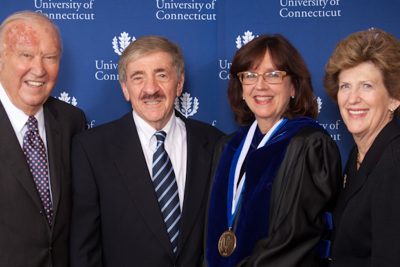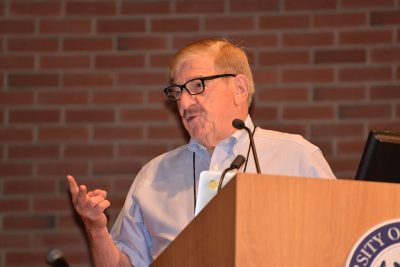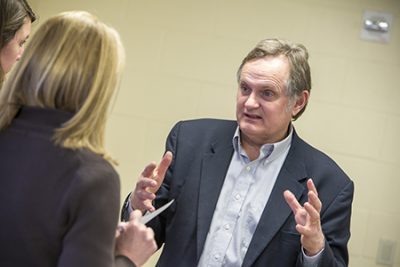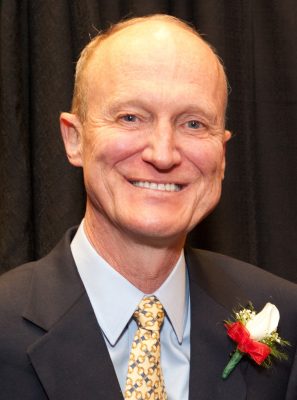
In the early 1990s, UConn alum Raymond Neag ’56 (CLAS) was enjoying a visit from his niece Sally Reis, and her lifetime partner, Joseph Renzulli. This one family gathering almost 25 years ago would ultimately make a tremendous impact on UConn, its education school, and the world of gifted education for years to come.
At the time, Reis remembers her uncle, who passed away in 2018, talking about a Wall Street Journal article he had read on Renzulli’s work in gifted education. “I had no idea how famous and well-known he was,” Reis recalls him saying.
“My uncle was so impressed with his work and was curious about what would be involved with developing an endowed chair so that Joe could expand on his work,” says Reis, today a UConn Board of Trustees Distinguished Professor and the Letitia Neag Morgan Chair in Educational Psychology at the Neag School.
Following the visit, she contacted the School’s development director, Frank Gifford, and Richard Schwab, who was serving as dean, about the possibility of her uncle establishing the School’s first-ever endowed chair. Shortly thereafter, Neag’s 1996 gift of $1.5 million, made in honor of his late wife, Lynn, came to fruition. The state of Connecticut even matched his donation, bringing the total contribution to $3 million. (During a two-year period that began in 1996, all private gifts of $25,000 or more were matched by the state, up to a total of $20 million).
“The area of gifted education and talent development became one of the top programs in the world, as evidenced by the federal government funding our National Research Center for a record five [recurring] five-year terms. No other national educational research center … has come close to that record.”
— Dean Emeritus and Neag Endowed Professor of Educational Leadership Richard Schwab
The gift, focused on supporting research into the teaching of gifted and talented children, was used not only to establish the Raymond and Lynn Neag Chair of Gifted Education and Talent Development, but also to create the Neag Center for Gifted Education and Talent Development at UConn. Renzulli was named the endowed chair and founding director of the newly created Center.
“That initial gift meant a lot to us,” says Renzulli, also a UConn Board of Trustees Distinguished Professor. “It helped us grow to the next level and gave us money to provide scholarships for graduate students, which was something that I think is a lasting legacy of any program.”
Renzulli served as founding director of the Neag Center, the Lynn and Ray Neag Endowed Chair for Talent Development, as well as the first director of the National Research Center on the Gifted and Talented (NRC/GT – 1990-2013), the only federally funded center on gifted and talented education. Under Renzulli’s guidance, the Neag Center evolved into one of the leading centers in gifted education and talent development in the world.
Setting Records
That initial gift, and the Neag Center’s founding, would become a significant part of the School’s first strategic plan in 1997.
“We had decided we would focus on a few areas of strength, which included the Department of Educational Psychology and our great programs in exceptionality. Our emphasis paid off, and we achieved our dream of having our special education program among the top 20 in the U.S,” recalls Schwab.
“Even more impressive, the area of gifted education and talent development became one of the top programs in the world, as evidenced by the federal government funding our National Research Center for a record five 23 years,” says Schwab. “No other national educational research center … has come close to that record.”
It was just the beginning of a series of historic accomplishments.
In 1999, Neag would donate an additional $23 million to UConn’s School of Education. At the time, it was UConn’s biggest gift ever from an individual donor and the largest gift to a university school of education in the country — not to mention a gift that ultimately led to the School taking on Neag’s name.
Over the course of its history, the Neag Center has garnered a total of more than $100 million in grants. Under Renzulli’s leadership, the Center has also “brought more than 25,000 educators from around the world into tiny Storrs, and inspired hundreds of schools and programs in our country through the Schoolwide Enrichment Model,” says Schwab.
Integral to the Neag Center’s work from 1990 to 2013 was the federally funded NRC/GT. This research arm of the Neag Center focused on making schools better places for developing students’ academic gifts. With Renzulli at the helm, the team conducted national research needs assessments to determine questions important to gifted education and talent development. Answers to these questions continue to influence policy and practice at national and international levels. The Neag Center continued its national research presence in 2014 with a $2 million grant from the Department of Education’s Institute of Education Sciences.
Now His Namesake

While Renzulli officially retired from UConn, he continued working with the support of federal grant funding on researching and writing about gifted education, advising graduate students, and participating in speaking engagements worldwide.
In July 2016, on Renzulli’s 80th birthday, Neag and his wife, Carole, asked that the Neag Center be renamed the Renzulli Center for Creativity, Gifted Education, and Talent Development to honor the work of Renzulli and Reis. That year also marked Renzulli’s 50th year at UConn.
“Although he’s technically retired, he works all the time,” says Reis. “He loves what he does and believes passionately in his work.”
The reins of leadership were passed this past August to Professor Del Siegle, named Renzulli Center director and the Lynn and Ray Neag Endowed Chair for Talent Development. In addition to directing the Renzulli Center, Siegle directs the National Center for Research on Gifted Education. He also previously served as the head of the Department of Educational Psychology and associate dean for research and faculty affairs.
The pandemic thwarted plans this past summer to honor and celebrate Renzulli’s three-decade leadership of the Center and mark Siegle’s transition into the role of director.
Regardless, says Reis, “leaving the Center Director’s position has given [Joe] the time, energy and opportunity to focus on contiuing his intellectual work.”
“Joe’s work has a lasting legacy because it is responsive to the needs and interests of practitioners by being grounded in the realities of K-12 schools and classrooms.”
— Del Siegle, Lynn and Ray Neag Endowed Chair for Talent Development
UConn Family

A central emphasis of the Renzulli Center is advocating a broadened conception of giftedness and a focus on the development of potential in groups not ordinarily included in special programs for the gifted and talented. Academically talented or high-potential students with disabilities, academic underachievers, and those who attend schools in high-poverty districts have been at the heart of its work for decades. This focus is integrated into all of the Center’s programs and services, including its affiliation with the Department of Educational Psychology’s graduate programs in giftedness, creativity, and talent development.
“There is an enormous network of people across the globe who have graduated from Neag School’s gifted programs,” says Reis, who earned a Ph.D. from UConn in 1981. “So many people have completed their degrees from UConn and feel part of this large family of scholars that we’ve created.”
One such graduate was Del Siegle ’95 Ph.D., who studied with Reis and Renzulli. “I was fortunate to be among one of the first groups of Ph.D. students whose graduate study was supported by the first National Research Center on the Gifted and Talented,” says Siegle.
“Working with Joe and the other faculty at NRC/GT allowed me to receive the best research training in the world,” says Siegle “It also provided me opportunities to meet and interact with other eminent and leading scholars in the field. I would not be the professor I am today if I had not had that opportunity at NRC/GT.”
E. Jean Gubbins ’79 6th Year, ’82 Ph.D., too, went on to become one of the School’s first faculty members in gifted and talented education.
When Renzulli and his colleagues wrote the national research center’s first grant, they included the phrase “dream, design, and destination,” which they hoped depicted how the Center’s team explored issues in the field and created a substantial research base responsive to critical issues in gifted education and talent development.
Gubbins notes how Renzulli has always sought assistance from district schools to test his ideas because he wanted to learn what worked best for teachers and their students.
“This professional approach to working with educators is one of the many reasons Dr. Renzulli’s work connects to so many people around the world,” she says.

According to Thomas P. Hébert ’93 Ph.D., a professor of gifted and talented education at the University of South Carolina and a past Neag School Outstanding Alumnus of the Year, “The work of the Renzulli Center has enabled me to strengthen my scholarship in gifted and talented education by remaining professionally connected to the team of highly respected UConn researchers.”
“Dr. Renzulli’s conception of developing gifted behavior in young people has resonated with educators for decades,” Hébert adds. “His inclusive approach to providing gifted education services and nurturing the development of talents is one that American society can understand, appreciate, and celebrate.”
Next Chapter and Renzulli’s Legacy
“Dr. Renzulli always reminded us that completing research studies was an intermediate goal,” says Gubbins. “Research needed to be accessible and usable by multiple target groups, which is why our website is a primary source for researchers and practitioners around the world.”
“Early in his career, Joe recognized the importance of student interest in promoting enjoyment, engagement, and enthusiasm for learning,” adds Siegle. “Joe’s work has a lasting legacy because it is responsive to the needs and interests of practitioners by being grounded in the realities of K-12 schools and classrooms.”
Schwab notes the impact of the Renzulli Center around the world. “I have had the honor to be a guest lecturer in many countries,” he says. “In every international venue that I have been to, the first thing they bring up to me when they learn I am from UConn, that the Neag School is the international leader in gifted education.”
 Facebook
Facebook
 Twitter
Twitter
 LinkedIn
LinkedIn
